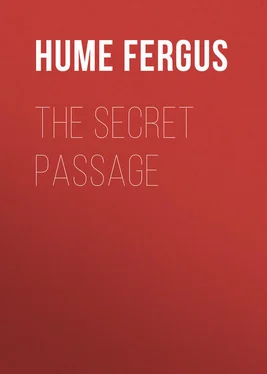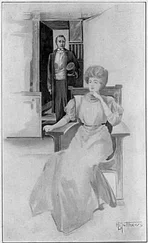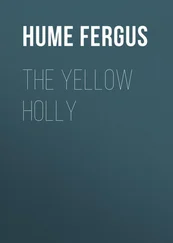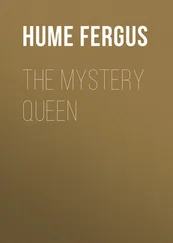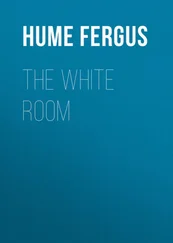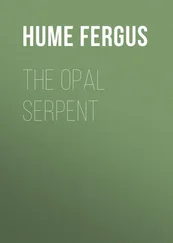Fergus Hume - The Secret Passage
Здесь есть возможность читать онлайн «Fergus Hume - The Secret Passage» — ознакомительный отрывок электронной книги совершенно бесплатно, а после прочтения отрывка купить полную версию. В некоторых случаях можно слушать аудио, скачать через торрент в формате fb2 и присутствует краткое содержание. Жанр: Классический детектив, foreign_detective, foreign_prose, foreign_language, на английском языке. Описание произведения, (предисловие) а так же отзывы посетителей доступны на портале библиотеки ЛибКат.
- Название:The Secret Passage
- Автор:
- Жанр:
- Год:неизвестен
- ISBN:нет данных
- Рейтинг книги:3 / 5. Голосов: 1
-
Избранное:Добавить в избранное
- Отзывы:
-
Ваша оценка:
- 60
- 1
- 2
- 3
- 4
- 5
The Secret Passage: краткое содержание, описание и аннотация
Предлагаем к чтению аннотацию, описание, краткое содержание или предисловие (зависит от того, что написал сам автор книги «The Secret Passage»). Если вы не нашли необходимую информацию о книге — напишите в комментариях, мы постараемся отыскать её.
The Secret Passage — читать онлайн ознакомительный отрывок
Ниже представлен текст книги, разбитый по страницам. Система сохранения места последней прочитанной страницы, позволяет с удобством читать онлайн бесплатно книгу «The Secret Passage», без необходимости каждый раз заново искать на чём Вы остановились. Поставьте закладку, и сможете в любой момент перейти на страницу, на которой закончили чтение.
Интервал:
Закладка:
"Now it is certain that Miss Loach met her death between the hours of ten and eleven. Susan Grant saw her alive at ten, seated in her usual chair with the cards on her lap, and at eleven, she there found her dead, still with the cards. It would seem as though immediately after the servants left the room someone had stabbed the deceased to the heart, before she had time to rise or even alter her position. But Susan Grant asserts that no one was in the room. There was only one door, out of which she departed. The bedroom of Miss Loach on the basement floor had a door which opened into the passage, as did the sitting-room door. No one could have entered until the servant departed. The passage was lighted with electricity, but she did not observe anyone about, nor did she hear a sound. She showed out Mr. Clancy and then returned to the kitchen. Certainly the assassin may have been concealed in the bedroom and have stolen into the sitting-room when Susan Grant was showing out Mr. Clancy. Perhaps then he killed the deceased suddenly, as we said before. He could have then come up the stairs and have escaped while the servants were at supper. It might have been the murderer who opened the door, and was overheard by Thomas.
"The policeman was on duty about ten, as he was seen by Susan Grant when she showed Mr. Clancy to the door. The policeman also asserted that he was again on the spot – i.e., in the roadway opposite the cottage – at eleven. At these times the assassin could not have escaped without being seen. There is no exit at the back, as a high wall running round an unfinished house belonging to the eccentric Lord Caranby blocks the way. Therefore the assassin must have ventured into the roadway. He could then have walked up the lane into the main streets of Rexton, or have taken a path opposite to the gate of Rose Cottage, which leads to the railway station. Probably, after executing the crime, he took this latter way. The path runs between quickset hedges, rather high, for a long distance, past houses, and ends within fifty yards of the railway station. The criminal could take the first train and get to town, there to lose himself in the wilderness of London.
"So far so good. But the strangest thing about this most mysterious affair is that the bell in the sitting-room rang two minutes before Susan Grant entered the room to find her mistress dead. This was some time after the closing of the door overheard by Thomas; therefore the assassin could not have escaped that way. Moreover, by this time the policeman was standing blocking the pathway to the station. Again, the alarm was given immediately by the other servants, who rushed to the sitting-room on hearing Susan's scream, and the policeman at once searched the house. No one was found.
"Now what are we to make of all this? The doctor declares that Miss Loach when discovered had been dead half an hour, which corresponds with the time the door was heard to open or shut by Thomas. So far, it would seem that the assassin had escaped then, having committed the crime and found the coast inside and outside the house clear for his flight. But who rang the bell? That is the question we ask. The deceased could not have done so, as, according to the doctor, the poor lady must have died immediately. Again, the assassin would not have been so foolish as to ring and thus draw attention to his crime, letting alone the question that he could not have escaped at that late hour. We can only offer this solution.
"The assassin must have been concealed in the bedroom, and after Susan ascended the stairs to let Mr. Clancy out, he must have stolen into the sitting-room and have killed the old lady before she could even rise. She might have touched the bell, and the button (the bell is an electric one) may have got fixed. Later on, the heat of the room, warping the wood round the ivory button, may have caused it to slip out, and thus the bell would have rung. Of course our readers may say that when pressed down the bell would have rung continuously, but an examination has revealed that the wires were out of order. It is not improbable that the sudden release of the button may have touched the wires and have set them ringing. The peal is described as being short and sharp. This theory is a weak one, we are aware, but the whole case is so mysterious that, weak as it is, we can offer no other solution.
"Mrs. Herne, the servants, and Messrs. Hale and Clancy were examined. All insist that Miss Loach was in her usual health and spirits, and had no idea of committing suicide, or of being in any danger of sudden death. The weapon cannot be discovered, nor the means – save as we suggest above – whereby the assassin can have made his escape. The whole affair is one of the most mysterious of late years, and will doubtless be relegated to the list of undiscovered crimes. The police have no clue, and apparently despair of finding one. But the discovery of the mystery lies in the bell. Who rang it? or did it ring of itself, as we suggest above."
Cuthbert laid down the paper with a shrug. The article did not commend itself to him, save as the means of making a precis of the case. The theory of the bell appeared excessively weak, and he could not understand a man being so foolish as to put it forward.
"If the button was pressed down by Miss Loach, the bell would have rung at once," argued Cuthbert; "and when it slipped up, even with the heat, the ringing would have stopped. But the bell rang at eleven, and the girl was in the room two minutes later. Someone must have rung it. But why did someone do this, and how did someone escape after ringing in so fool-hardy a manner?"
He could not find an answer to this question. The whole case was indeed most perplexing. There seemed absolutely no answer to the riddle. Even supposing Miss Loach had been murdered out of a long-delayed revenge by a member of the Saul family – and that theory appeared ridiculous to Mallow – the question was how did the assassin escape? Certainly, having regard to the cards still being on the lap of the deceased, and the closing of the door at a time when the policeman was not in the vicinity, the assassin may have escaped in that way. But how did he come to be hidden in the bedroom, and how did he kill the old lady before she had time to call out or even rise, seeing that he had the whole length of the room to cross before reaching her? And again, the escape of the assassin at this hour did not explain the ringing of the bell. Cuthbert was deeply interested, and wondered if the mystery would ever be solved. "I must see Jennings after all," he thought as the train steamed into Paddington.
And see Jennings he did, sooner than he expected. That same evening when he was dressing to go out, a card was brought. It was inscribed "Miles Jennings." Rather surprised that the detective should seek him out so promptly, Cuthbert entered his sitting-room. Jennings, who was standing with his back to the window, saluted him with a pleasant smile, and spoke to him as to an equal. Of course he had every right to do so since he had been at school with Mallow, but somehow the familiarity irritated Cuthbert.
"Well, Jennings, what is it?"
"I came to ask you a few questions, Mallow."
"About what?"
"About the murder at Rose Cottage."
"But, my dear fellow, I know nothing about it."
"You knew Miss Loach?"
"Yes. I saw her once or twice. But I did not like her."
"She is the aunt of the young lady you are engaged to marry?"
Mallow drew himself up stiffly. "As a matter of fact she is," he said with marked coldness. "But I don't see – "
"You will in a minute," said Jennings briskly. "Pardon me, but are you in love with another woman?"
Mallow grew red. "What the devil do you mean by coming here to ask me such a question?" he demanded.
"Gently, Mallow, I am your friend, and you may need one."
Читать дальшеИнтервал:
Закладка:
Похожие книги на «The Secret Passage»
Представляем Вашему вниманию похожие книги на «The Secret Passage» списком для выбора. Мы отобрали схожую по названию и смыслу литературу в надежде предоставить читателям больше вариантов отыскать новые, интересные, ещё непрочитанные произведения.
Обсуждение, отзывы о книге «The Secret Passage» и просто собственные мнения читателей. Оставьте ваши комментарии, напишите, что Вы думаете о произведении, его смысле или главных героях. Укажите что конкретно понравилось, а что нет, и почему Вы так считаете.
